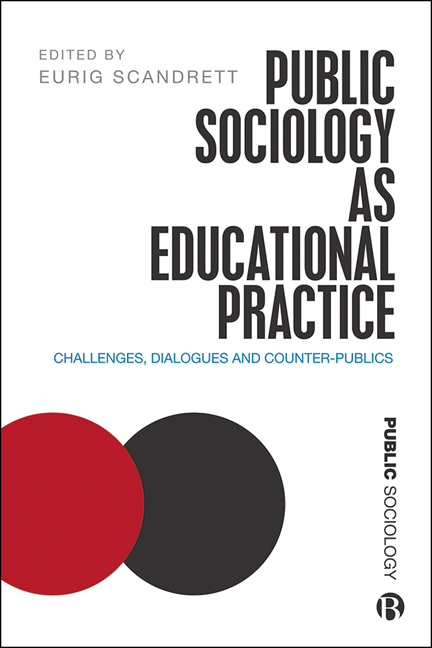III.2 - Student– Public– Sociologist: On Dialogue with our First Public, and in Widening Access to Higher Education
Published online by Cambridge University Press: 02 March 2021
Summary
Introduction
By some measurements, I should not be in a position where I can contribute a chapter to an academic text. I entered university as a mature, working class, first generation student from a rural background, with less than impressive school attainment and a menial employment history. Here, as an early career lecturer experiencing culture shock, imposter syndrome and struggling with my mental health at time of writing, I reflect on the impact of dialogue on the Scottish widening access agenda and of students as arguably our first and most important public.
If Burawoy's address acts as a foundation of discussion here then let us consider his thesis on ‘The multiplicity of public sociologies’ – where perhaps lost among assertions of traditional and organic public sociology, Burawoy (2005: 9) describes students as ‘carriers of a rich lived experience’ and of ‘ambassadors of sociology’. Back (2016: 46) is more straightforward, identifying students as ‘our first public and often our most important audience and some of them are also our future colleagues’. Rather than simply a homogeneous mass, students experience their degree careers in the public sphere as a collective of diverse backgrounds and private issues.
The UK widening access agenda seeks to move beyond the traditional white middle class student population, and the Scottish approach has been to reduce financial and attainment barriers to entering higher education (HE), to instil a greater sense of meritocracy and social equality in society (Iannelli, 2011; Tigh, 2012; Lasselle, 2016; Rainford, 2016; Sosu et al, 2016). Friedman (2016), Reay (2017) and others can evidence and attest to the fact however, that this simplistic and short-sighted numbers management has thus far served only to perpetuate class and minority inequality, and further stratify HE. Decision makers have ignored ‘the complexities of the [social] mobility experience’ (Friedman, 2016: 145) and significance of forms of capital available – or not – to students from different backgrounds. At times the politicised goals of reducing inequality and increasing social mobility have become conflated with achieving targets and success in league tables (Ianelli 2011; Gallacher 2014; Weedon 2016).
Defining widening access/widening participation (WP) and the groups to which it refers in Scotland varies across governmental policy (Scottish Government, 2016), sectoral direction (HEA, 2013) and academic literature.
- Type
- Chapter
- Information
- Public Sociology as Educational PracticeChallenges, Dialogues and Counter-Publics, pp. 253 - 266Publisher: Bristol University PressPrint publication year: 2020



